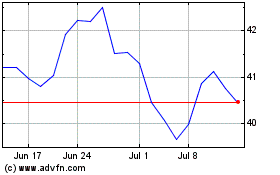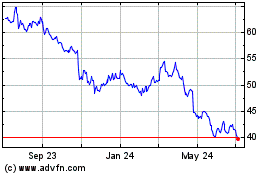Race Tightens for Next Wave of Cancer Drugs
March 06 2017 - 9:47AM
Dow Jones News
By Peter Loftus
WILMINGTON, Del. -- In the race to develop the next wave of
drugs that use the immune system to fight cancer, scientists scurry
up and down escalators in an old department store here.
Their biotechnology company, Incyte Corp., set up shop in a
former John Wanamaker store on the outskirts of Wilmington in 2014.
Escalators that once ushered shoppers to home furnishings now take
researchers to labs that are among the most closely watched in drug
development, as Incyte attempts to develop a new generation of
cancer immunotherapies.
Existing immunotherapies including Merck & Co.'s Keytruda
and Bristol-Myers Squibb Co.'s Opdivo have transformed cancer
treatment, boosting average survival rates in lung and skin
cancers.
But the current immunotherapies don't benefit all patients -- a
limitation spurring the industry to hunt for new ways to push
immune cells to destroy tumors. Companies big and small are racing
to develop these new medicines, which analysts say could help boost
global cancer immunotherapy sales to more than $40 billion a year
by the middle of the next decade, from more than $6 billion in
2016. The field is so hot, activist investors including Carl Icahn
recently bought shares in Bristol-Myers out of interest in the
company's immunotherapies and other drugs.
Researchers are now studying more than 1,100 immunotherapy
drugs, up from about 500 two years ago, according to the Cancer
Research Institute, a nonprofit that funds immunotherapy
research.
Analysts say Incyte is one of the closest to market with the new
immunotherapies. Credit Suisse estimates Incyte's experimental
drug, epacadostat, could generate global sales of at least $3.4
billion in 2025 if regulators approve it for sale, an expectation
that has helped more than double Incyte's market value to over $25
billion in the past year. Incyte, which already sells a separate
drug called Jakafi for blood cancers, reported global revenue of
$1.1 billion last year.
"We are at the beginning of an entire field where we can see
applications in every type of cancer," Herve Hoppenot, a former
head of Novartis AG's oncology unit who became Incyte's CEO in
2014, said in an interview.
Analysts caution that the promising data in early studies of
epacadostat may not translate into positive results in the larger
trials now under way. And Incyte faces intense competition from
other companies developing new immunotherapies.
Incyte scientists discovered epacadostat based partly on
fetal-development research at the Medical College of Georgia in the
1990s. That research showed that the immune systems of pregnant
women don't reject fetuses because the placenta harbors an enzyme
called IDO1. Subsequent research at Université Catholique de
Louvain in Belgium found that tumor cells exploit the same enzyme
to prevent the immune system from destroying them.
Epacadostat, taken as a pill, is designed to block IDO1 on and
around tumor cells to allow the immune system to shrink tumors.
Incyte's research on the IDO1 program began in 2005, at a time
when few people thought immunotherapy could effectively fight
cancer. Peggy Scherle, Incyte's vice president of preclinical
pharmacology, recalls showing a slide presentation that year to the
company's top executives listing the pros and cons of targeting
IDO1. One con she included in her slides: "Immunotherapy has never
been shown to work."
The company screened tens of thousands of chemical compounds,
finding one that seemed to block the effects of IDO1, Ms. Scherle
said.
Early studies showed that when used as a stand-alone drug it had
a limited effect. But the drug showed promise in subsequent studies
when used in combination with Merck's Keytruda, which works on the
immune system in a different way. A closely watched study of that
combination in melanoma patients is due to be completed in
2018.
Incyte also is testing epacadostat in combination with other
immunotherapy drugs developed by Bristol-Myers, AstraZeneca PLC and
Roche Holding AG. Incyte got a boost in January when it agreed with
Merck to test the epacadostat-Keytruda combination in several
additional tumor types beyond melanoma, including lung cancer.
Incyte started as a California biotech focused on DNA sequencing
in the 1990s but shifted to drug discovery after hiring a new CEO,
Paul Friedman, who previously led the pharmaceutical unit of
chemical giant DuPont Co. He moved Incyte to Delaware and hired a
batch of former DuPont scientists after DuPont sold its
pharmaceutical unit; Dr. Friedman retired as CEO in 2014.
Incyte initially rented lab space from DuPont, but as it grew
executives wanted a home of their own. The old Wanamaker store,
known to area shoppers for having a stuffed teddy bear on a swing,
had closed in the early 1990s and was later converted to office
space.
Incyte Chief Scientific Officer Reid Huber says the old store's
high ceilings turned out to be ideal for labs because there was
plenty of room to run pipes above drop ceilings. Incyte has
received economic incentives from the Delaware state government to
remain in state, and is currently constructing a second building on
the site.
Write to Peter Loftus at peter.loftus@wsj.com
(END) Dow Jones Newswires
March 06, 2017 09:32 ET (14:32 GMT)
Copyright (c) 2017 Dow Jones & Company, Inc.
Bristol Myers Squibb (NYSE:BMY)
Historical Stock Chart
From Mar 2024 to Apr 2024

Bristol Myers Squibb (NYSE:BMY)
Historical Stock Chart
From Apr 2023 to Apr 2024
